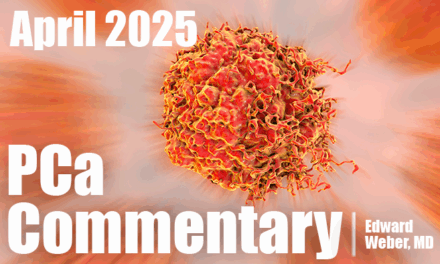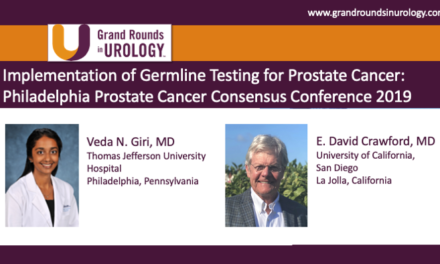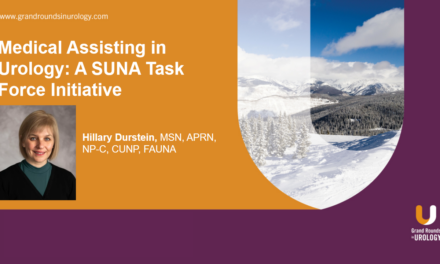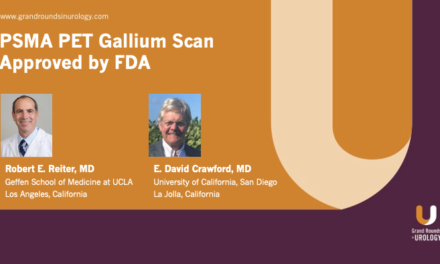Steven E. Finkelstein, MD, FACRO, and Kevin Healey presented “Role of ADT with Radiation” during the 31st International Prostate Cancer Update in July 2021 in Snowbird, Utah.
How to cite: Finkelstein, Steven E and Healey, Kevin. “Role of ADT with Radiation.” July 2021. Accessed Jul 2025. https://grandroundsinurology.com/role-of-adt-with-radiation/
Role of ADT with Radiation – Summary
Steven E. Finkelstein, MD, FACRO, a radiation oncologist with Florida Cancer Affiliates in Panama City, Florida, discusses the role of androgen deprivation therapy (ADT) with radiation therapy (RT) in patients with prostate cancer. Dr. Finkelstein first discusses the definitive setting, explaining optimal durations for the addition of ADT to RT under various circumstances. For example, when local control with RT alone is good, ADT is never given; when the risk of local failure is high, ADT is given for 3-6 months as a radiation sensitizer; and when the risk of distant disease is high, ADT treatment is given for 2-3 years. Dr. Finkelstein goes on to illustrate data that show ADT does not improve survival in men receiving RT for low-risk disease, short-term ADT improves survival in men receiving RT for intermediate-risk disease, and ADT was effective in improving survival for patients with “modern” high- and intermediate-risk disease. Dr. Finkelstein discusses dose escalation in RT and cites an ongoing study examining 1520 patients who received either 79.2 Gy alone or 79.2 Gy plus 6 months of ADT, with the primary endpoint being overall survival (OS), asserting that the study will be seminal once the results have been published. He then reviews the current summary recommendations in the definitive setting: for low-risk (NCCN definition) and low-intermediate-risk patients, the recommendation is surveillance, brachytherapy (BT), or external beam radiation therapy (EBRT) with no recommendation for ADT; for high-intermediate risk patients, the recommendation is EBRT +/- BT with 4-6 months of ADT (GnRH agonist); and for high-risk (NCCN definition) patients, the recommendation is EBRT +/- BT with 24 months of ADT(GnRH agonist). Dr. Finkelstein then introduces Kevin D. Healey, a research intern and medical student level two, who delivers the second part of the presentation, focusing on the salvage setting. Mr. Healey presents research from the GETUG-AFU 16 trial, examining short-term ADT combined with RT as salvage treatment after radical prostatectomy for prostate cancer: a 112-month follow-up of a phase 3, randomized trial. He concludes that salvage RT combined with short-term ADT significantly reduced the risk of biochemical or clinical progression and death compared with salvage RT alone. Further, the results of the trial confirm the efficacy of ADT plus RT as salvage treatment in patients with increasing PSA concentration after radical prostatectomy for prostate cancer. Dr. Finkelstein then concludes the presentation with the current summary recommendations for the salvage setting, including adding a 6-month course of ADT (LHRHa) to salvage RT in men with no or minimal comorbidity, given the near halving of progression and the possible reduction in mortality due to prostate cancer.
About The 31st Annual International Prostate Cancer Update:
The International Prostate Cancer Update (IPCU), founded in 1990, is a multi-day CME conference focused on prostate cancer treatment updates with expert, international faculty. It is led by expert physicians and is designed for urologists, medical oncologists, radiation oncologists, and other healthcare professionals involved in the diagnosis and treatment of prostate cancer. Dr. Finkelstein delivered this educational activity during the 31st iteration of the meeting in July 2021 in Snowbird, Utah.
ABOUT THE AUTHOR
Steven E. Finkelstein, MD, FACRO, is the Director of the Center of Advanced Radiation Excellence, and Director of Radiation Oncology Research for Associated Medical Professionals in Syracuse, New York. His interests include the research of a variety of cancers, busting radiation driven, and personalized systemic therapy. He holds three international patents in the field of cutting edge technologies.
Dr. Finkelstein received his medical degree from the University of Michigan Medical School, graduating cum laude eruditions causa. He then joined the National Cancer Institute, National Institutes of Health as Clinical Associate. He completed both Surgical Oncology Fellowship as well as Clinical Immunotherapy Fellowship, and an additional radiation oncology residency.
He served a residency in General Surgery at Washington University in Saint Louis, Missouri, Dr. Finkelstein also served fellowships in Biologic Immunotherapy, Clinical Cancer, and Surgical Oncology at the Surgery Branch of the National Cancer Institute in Bethesda, Maryland. He is a member of the American College of Radiation Oncology, the American Medical Association, the American Society of Clinical Oncology, the American Society for Therapeutic Radiology and Oncology, the Radiological Society of North America, and the Radiation Therapy Oncology Group.
He has served as a Co-Chair on the NRG Immunotherapy Committee, Co-Chair of the 2018-2019 ACRO Scientific Program Committee, and Chair of the SWOG Radiation STG Committee. He currently serves on the Board of Chancellors for ACRO. Dr. Finkelstein has also served as National Director of Translational Research Consortium (TRC), the cutting-edge therapy arm of 21st Century Oncology in Scottsdale, Arizona. Inspired by his grandmother, a cancer patient, he became a dedicated cancer surgeon who found that radiation therapy could sometimes do for his patients what surgery could not.





